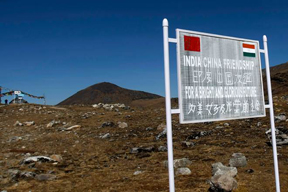 BEIJING: China said today an Indian drone “intruded” into its airspace and crashed in the Sikkim sector which includes Dokalam, prompting Beijing to lodge a diplomatic protest with India over the violation of China’s territorial sovereignty.
BEIJING: China said today an Indian drone “intruded” into its airspace and crashed in the Sikkim sector which includes Dokalam, prompting Beijing to lodge a diplomatic protest with India over the violation of China’s territorial sovereignty.
China’s Defense Ministry and the Ministry of Foreign Affairs said that the Indian unmanned aerial vehicle (UAV) crashed into the Chinese side of the border recently.
“Recently an Indian Unmanned Aerial Vehicle, (UAV) invaded China’s airspace and crashed in the Sikkim section of China-India border,” Chinese Foreign Ministry spokesman Geng Shuang told a media briefing here.
However, there was no immediate response from the Indian Defense Ministry.
He said the Chinese border troops had taken a “professional and responsible attitude” to verify the device. “I want to point out that the Sikkim section of the China India border has been delimited,” he said, in an apparent reference to the 1890 China-British Treaty.
Geng did not spell out when the incident had taken place.
He said further details can be obtained from the Chinese military.
Beijing often referred to the 1890 Britain-China treaty during the lengthy Dokalam standoff, stating that it has defined the Sikkim section of the boundary with Tibet, therefore the border in that area has been settled.
“The action of the Indian side violated China’s sovereignty and it is not conducive to the peace and tranquility of the border area and China is dissatisfied with this and lodged solemn representation with the Indian side,” Geng said.
In its diplomatic protest to India, “China asked the Indian side to stop the activities of the devices near the border and work with China to maintain peace and tranquility of the border areas”, he said.
Geng declined to reveal the details of the drone. He did not confirm whether it has taken place near the Dokalam where the two countries were locked in a 73-day-long border standoff which ended on August 28.
The standoff ended after Chinese troops stopped building a key road close to India’s Chicken Neck corridor.
India had objected to the construction highlighting its security concerns. The road was being built by the Chinese troops in the area also claimed by Bhutan.
Asked whether the protest was lodged in Beijing or Delhi, he said he is not aware of the details.
“I know that China has lodged solemn representation to the Indian side,” he said.
Earlier, the Chinese military alleged that an Indian drone has “intruded” into its airspace recently and crashed into the Chinese side of the border and voiced strong dissatisfaction and opposition over the incident.
The Indian UAV “intruded” into China’s airspace and crashed recently, and China’s border troops have conducted identification and verification over the vehicle, Zhang Shuili, deputy head of the combat bureau of the Western Theatre Command’s joint staff department said.
The Chinese military’s western theatre command jurisdiction covers all most all of the Line of Actual Control (LAC) and including Tibet’s border region with India and the Ladakh region.
“India’s move has infringed upon China’s territorial sovereignty, and we are strongly dissatisfied with and opposed to this,” Zhang has been quoted by state-run Xinhua news agency as saying.
“We will fulfill our mission and responsibility and defend China’s national sovereignty and security resolutely,” he said.
The military’s charge comes ahead of Chinese Foreign Minister Wang Yi’s visit to New Delhi to take part in the Russia-India-China (RIC) Foreign Ministers meeting to be held on December 11.
Asked whether, the drone issue would figure in Wang’s talks with Indian officials when he visits New Delhi, Geng said the “goal” of the Chinese foreign minister’s visit was to attend the RIC meeting.
“When he is in India he will meet with the senior officials of the Indian side. At that time, the two sides will exchange views on China-India relations and other issues of the common concern,” he said.
Wang’s visit to Delhi will be the first visit by a top Chinese official to India after the Dokalam crisis and commencement of the second five-year term for Chinese President Xi Jinping.
It is expected to be followed by the 20th round of India-China boundary talks in New Delhi between Chinese State Councilor Yang Jiechi and National Security Adviser Ajit Doval, who are the designated Special Representatives.-PTI






